When it comes to fine print in the world of business insurance, it can feel like you’re reading another language. To make life easier, we’ve done the translating for you and created a simple, comprehensive guide on all things Business Insurance for the self-employed.
In Part 3 of our guide, we go back to basics with Business Insurance and the main kind of coverage options to consider.
What is Business Insurance?
Business Insurance* is an insurance package designed to provide cover for your business contents, stock, tools and commercial premises when an insured event occurs (such as fire, storm, theft or even accidental damage).
A Business Insurance package can also cover your portable equipment, glass, tax audit and for loss of revenue due to business interruption in specified circumstances.
Sometimes sold as a business pack, it offers different types of insurances to suit your business and protect it from potential risks. A way to look at what business insurance options your business may need is by gauging what you couldn’t afford to be without.
These are some of the different types of Business Insurance coverages available for selection.
Business Interruption*
For even the most prepared self-employed workers, an unexpected event can cause chaos for your business. Business Interruption cover provides protection for the loss of income and increased costs of operating your business caused by a specified insured event (such as property damage or fire). It is designed to help your business recover from an insured event by paying ongoing expenses (such as wages or rent).
What’s typically covered*?
- Loss of turnover due to damage to your own premises as a result of an insured event
- Additional costs of working
What’s typically NOT covered*?
- Undocumented income
- Losses due to labour strikes and changes in legislation
- Losses beyond the indemnity period
- Voluntary closures
- Losses due to breakdown in equipment or machinery
This is Eliza’s story on how a violent storm swept through her Sydney hair salon, Blondies, in 2017. Her Business Interruption insurance helped keep her business afloat by maintaining her cash flow while they were closed for repairs.
Contents*
Covers your business contents or stock if they were damaged in a fire, storm or due to malicious damage or some other defined event listed in the policy. Even if you run a home-based business with a personal contents policy in place, your business contents are likely to be excluded.
Some of the insured events that are typically covered* by a Contents insurance policy include:
- Fire
- Lightning and explosions
- Storm, wind and water
- Earthquake
- Impact damage
- Malicious damage and vandalism
- Accidental damage
Some of the events that are typically not included* under a Contents Insurance policy include:
- Wear, tear or gradual deterioration
- Intentional damage caused by you
- Damage caused by insects or animals
- Rust, mould or mildew
- Machinery breakdown
- Computer virus or hacking
- Pollution
- Any person deliberately switching off power supply
- Faulty design or workmanship
Tax Audit*
No matter how squeaky clean your books are, a call from the Australian Tax Office (ATO) requesting an audit is enough to make you panic.
Tax Audit Insurance covers a business for specified costs if the ATO selects it for auditing. The policy covers the costs of accountants and other professional fees incurred in the course of an audit. The process of an audit can be time-consuming, complicated and could possibly create a significant financial impact.
Having the expertise of an external accountant or similar professional to get the job done right can be very costly. Fortunately, this is where Tax Audit insurance comes into play.
What is typically included?*
- Accountants fees
- Tax agent fees
- Limited other professional’s fees incurred to responding to a tax audit
What is typically not covered?*
- Fines or taxes imposed
- Your time or salary or lost opportunities
- Your employee’s time or wages
Portable Equipment*
Portable Equipment insurance (also known as General Property insurance) covers you for loss and damage to items of portable equipment associated with your business. These can include tools of trade and items of stock.
Tradies with tools, mobile hair and beauty artists with makeup and dryers, consider Portable Equipment cover if you run a mobile business and rely on your tools of trade to get the job done.
What’s typically covered*?
Loss or damage that is caused by:
- Fire, storm, water, explosion, impact or malicious damage
- Accidental damage
- Collision or overturning of the conveying vehicle
- Theft following forcible and violent entry to locked vehicles or locked buildings
- Theft of equipment securely attached to a vehicle through the use of locks or padlocks
Specified portable equipment can include items such as:
- Mobile plant
- Photographic or video equipment
- Mobile communication equipment, including telephones and radios
- Electronic equipment, including computers, diaries, GPS units
- Accessories for the items listed above
What’s typically NOT covered*?
Loss or damage to your portable equipment that is caused by:
- Wear, tear or gradually developing conditions
- Cracking, scratching, marring or breakage of glass or fragile items or surfaces
- Rust, oxidation, mildew, mould, moths, insects, vermin, dry rot, contamination or pollution
- Any process of heating, drying, cleaning, dyeing or alteration to any insured item Faulty materials or workmanship
- Theft by employees
- Unexplained inventory shortage
Need a hand with your business insurance?
For more information and a hassle-free experience give us a call or jump online. At BizCover, we make arranging your business insurance easy and lingo-free. Receive multiple quotes from some of Australia’s leading insurers in minutes.


